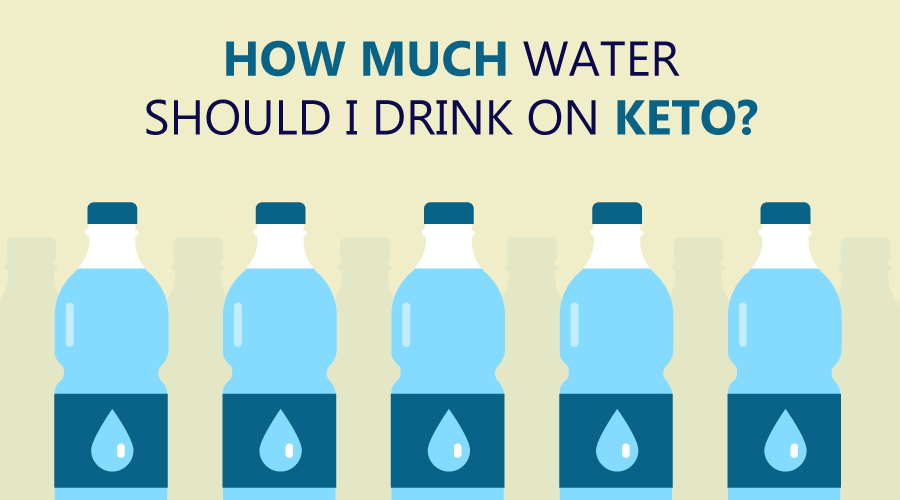It’s fascinating how much water our bodies need, especially on a specialized diet like keto. Many people underestimate the significance of hydration in this low-carb, high-fat diet. In ketosis, your body flushes out more water and electrolytes, increasing the need for adequate hydration.
Historically, the keto diet has been used to manage epileptic seizures, but its modern adaptation demands about 2.5 to 3 liters of water daily. This ensures proper metabolic function and electrolyte balance, crucial for maintaining health on keto. Staying hydrated helps prevent common issues like the “keto flu,” a set of symptoms that can hinder keto adoption.

Understanding the Keto Diet
The Keto diet is a high-fat, low-carb diet designed to help the body enter a state called ketosis. In ketosis, your body burns fat for energy instead of carbohydrates. This diet can have significant benefits for weight loss and blood sugar control.
Originally, the Keto diet was developed to help manage epilepsy in children. Today, it’s popular for weight loss and improving mental clarity. It’s fascinating how changing one’s diet can impact health so profoundly.
Foods commonly consumed on a Keto diet include meats, cheese, eggs, and low-carb vegetables. These foods have minimal carbohydrates, making it easier to maintain ketosis. Eating high-fat foods helps keep you feeling full.
One challenge of the Keto diet is the initial adjustment period, often called the “keto flu.” This period can include symptoms like fatigue and headache. Drinking plenty of water and getting enough electrolytes can help ease these symptoms.
Hydration Needs on Standard Diets versus Keto Diet
Hydration is vital whether you’re following a standard diet or a keto diet, but the requirements differ. On a keto diet, your body loses more water, increasing hydration needs. Understanding these differences can help maintain good health.
Hydration on Standard Diets
On a standard diet, most people need about 2 to 3 liters of water daily. This amount can vary based on factors like activity level and climate. Foods like fruits and vegetables also contribute to hydration.
The body’s main source of hydration is the water we drink. However, other beverages like milk, juice, and tea also help. A diverse diet can support your hydration needs effectively.
Standard diets typically have more carbohydrates. These carbs can help retain water in the body, reducing the need for added hydration. This is one reason why hydration needs differ when switching to a keto diet.
Why Keto Increases Hydration Needs
When on a keto diet, the body enters ketosis. Ketosis leads to increased water loss through urine. This happens because carbs hold onto water, and reducing carbs decreases the water retention in the body.
Many people on a keto diet need to drink more than 3 liters of water daily. This helps prevent dehydration and supports metabolic functions. Increased water intake is essential to avoid symptoms of dehydration.
Electrolyte balance is crucial on a keto diet. As the body loses water, it also loses electrolytes like sodium, potassium, and magnesium. Replenishing these nutrients through diet or supplements is important.
Managing Hydration on a Keto Diet
To manage hydration, people on keto should monitor their water intake carefully. Drinking water with added electrolytes can be beneficial. Foods high in water content like cucumbers and lettuce also help.
- Drink at least 2.5 to 3 liters of water daily.
- Include electrolyte-rich foods or supplements.
- Monitor signs of dehydration like headaches and fatigue.
Planning meals to support hydration is helpful. Hydrating beverages such as herbal teas and bone broth can also be included. Staying consistent with water intake can make the keto diet more manageable.
Significance of Hydration in the Keto Diet
Hydration is crucial when you’re following a keto diet. Without enough water, you’ll experience dehydration that can hinder your progress. The body loses more water on a keto diet, making hydration essential.
Proper hydration helps in maintaining kidney function, which is vital for filtering waste. It also aids in digestion and nutrient absorption. Drinking plenty of water helps prevent kidney stones, a risk on a high-protein diet.
Hydration also impacts your energy levels and mental clarity. Many people notice brain fog and fatigue when they don’t drink enough water. Staying well-hydrated can help you feel more energetic and focused.
- Boosts metabolism and aids weight loss
- Regulates body temperature
- Maintains skin health
- Helps in muscle function
Electrolytes are crucial when discussing hydration on keto. You lose electrolytes through sweat and urine, so replenishing them is key. Electrolytes like sodium, potassium, and magnesium support muscle function and overall well-being.
How Much Water To Consume On a Keto Diet
On a keto diet, the general recommendation is to drink at least 2.5 to 3 liters of water daily. This helps to counteract the loss of water due to reduced carbohydrate intake. Adequate hydration is essential for health and well-being.
Different factors may influence individual water needs, such as activity level, climate, and personal metabolism. Athletes or those in hot climates might need even more water. Listening to your body is important when determining the right amount.
Drinking water consistently throughout the day helps maintain hydration levels. It’s better to sip water regularly rather than consuming large amounts at once. This approach helps the body absorb water more effectively.
Aim to include water-rich foods in your diet as well. Vegetables like cucumbers, celery, and zucchini have high water content.
- Cucumber: 95% water
- Celery: 95% water
- Zucchini: 94% water
These foods can contribute to your daily hydration needs.
Don’t forget about electrolytes when drinking water on a keto diet. Electrolytes like sodium, potassium, and magnesium are crucial for maintaining fluid balance. Adding a pinch of salt to your water or consuming electrolyte supplements can be beneficial.
If you experience symptoms like dry mouth, headaches, or dizziness, it might be a sign of dehydration. Increasing your water intake can help alleviate these issues. It’s crucial to stay hydrated to get the most out of your keto diet.
Other Sources of Hydration Suitable for Keto Diet
Water isn’t the only way to stay hydrated on a keto diet. Certain beverages are keto-friendly and can help meet your hydration needs. Incorporating these options can make drinking more enjoyable.
Herbal teas are an excellent choice for hydration. They have no carbs and come in various flavors, offering a refreshing change from plain water. Some teas also provide additional health benefits.
- Mint tea
- Chamomile tea
- Green tea
Bone broth is another fantastic option. It’s rich in essential nutrients and has electrolytes that help maintain fluid balance. Drinking bone broth can be especially beneficial during the keto flu.
Vegetables with high water content can also contribute to your hydration. Cucumbers, celery, and lettuce are excellent choices. These vegetables provide hydration while keeping your carb count low.
- Cucumber: 95% water
- Celery: 95% water
- Lettuce: 96% water
Coconut water is another option, but be mindful of its carb content. It’s high in electrolytes like potassium, making it an effective hydrator. Choose unsweetened versions to keep carbs in check.
Incorporating a variety of these hydration sources into your diet can ensure you stay well-hydrated. Balancing these with adequate water intake will help you feel your best on keto. Staying hydrated is essential for overall health and the success of your keto journey.
Signs and Symptoms of Dehydration on Keto Diet
Dehydration can sneak up on you, especially when following a keto diet. One common sign of dehydration is having a persistent dry mouth. Paying attention to how your body feels is crucial.
Another symptom is headaches that won’t go away. If you find yourself with a headache even after resting, dehydration might be the cause. Make sure to drink water regularly.
Fatigue and tiredness can also be signs of dehydration. Feeling unusually drained throughout the day? Increasing your water and electrolyte intake can help combat this.
- Dry, sticky mouth
- Headache
- Fatigue and tiredness
- Dark yellow urine
- Dizziness or light-headedness
If your urine is dark yellow, it’s often a sign you’re not drinking enough water. Clear or light yellow urine usually means you are well-hydrated. Monitoring urine color can be a useful tool.
Dizziness and light-headedness are more severe symptoms of dehydration. These signs mean it’s urgent to increase your fluid intake. If you experience these, consider drinking a rehydration solution or seeing a healthcare professional.
By keeping an eye out for these signs, you can act quickly to stay hydrated. Proper hydration is vital for feeling good and achieving success on a keto diet. Make hydration a priority to maintain your well-being.
Key Takeaways
- Drink at least 2.5 to 3 liters of water daily on keto.
- Keto diet increases water loss, making hydration crucial.
- Adjust water intake based on your activity level and needs.
- Adequate hydration supports metabolism and electrolyte balance.
- Listen to your body and increase intake if experiencing dehydration signs.

Frequently Asked Questions
Diving into the keto diet often brings up questions about hydration. Below, we answer some common queries to help you stay informed and healthy.
1. What is the role of water in the keto diet?
Water plays a crucial role in helping your body enter and maintain ketosis. When your carb intake is low, your body produces ketones, which can lead to increased urination.
This means you need extra hydration to replace lost fluids. Drinking enough water also helps support kidney function and prevent kidney stones.
2. How can I tell if I am dehydrated on a keto diet?
Common signs of dehydration include dry mouth, dark yellow urine, and persistent headaches. If you notice any of these symptoms, it’s important to increase your water intake immediately.
Other signs include feeling dizzy or light-headed and experiencing muscle cramps. Keeping track of these symptoms can help you stay adequately hydrated.
3. Can drinking too much water be harmful on a keto diet?
Yes, drinking an excessive amount of water can dilute essential electrolytes in your body. This condition, known as hyponatremia, can lead to serious health issues like swelling in cells or fluid imbalance.
It’s crucial to balance water intake with adequate electrolytes like sodium and potassium. Electrolyte supplements can help maintain this balance effectively.
4. Are there specific times during the day that are best for hydrating?
Sipping water throughout the day is better than drinking large amounts at once. Start your morning with a glass of water to kickstart hydration after sleep.
You should also drink before and after exercise or any physical activity to replenish lost fluids. Spreading out your intake makes it easier for your body to absorb.
5. What types of beverages are best for staying hydrated on keto?
The best choice is plain water, but other hydrating options include herbal teas and bone broth. These provide additional nutrients without adding carbs.
Coconut water is another option but choose unsweetened versions due to carb content. Always check nutritional labels to ensure they align with your keto goals.

Conclusion
Staying properly hydrated is crucial for anyone on a keto diet. The unique demands of this low-carb, high-fat lifestyle necessitate increased water and electrolyte intake. Consistent hydration supports overall health and optimizes keto benefits.
Whether through drinking water, herbal teas, or water-rich vegetables, ensure you’re meeting your hydration needs. Monitoring for signs of dehydration will help you stay proactive. By prioritizing hydration, you can enjoy a more successful and healthy keto journey.
